Man Refuses To Give In To Depressed Wife's Demands For Another Pet Because He Knows He Will Have To Take Care Of It
People often think that having a pet will magically cure their depression, but this is a misconception. While pets can provide companionship and a sense of purpose and can help reduce stress and anxiety levels, they do not have the ability to cure depression.
Mental health conditions such as depression require specialized care, such as therapy or medication, to be effectively treated. We have one of those stories today:
OP's wife loves dogs, but he generally is not a dog person. When the couple moved in together, she brought her dog with her, which was agreed to by everyone.
Some years later, she began to discuss getting a second dog, and after months of her talking about it, OP finally agreed, and they brought home another puppy. The first few months were pretty hard - the typical puppy behavior and necessary training (housebreaking, etc.) led to a lot of stress, cleanups, and damage.
Over time, the puppy did settle down (and still is a good boy), but the presence of two dogs in the house was still an overall negative experience for OP.
About a year ago, the first dog died. This dog meant a lot to his wife, so his loss was very hard for her and their kids. A few months later, they also lost a cat, which made the grief even more difficult.
Since they lost those pets, OP's wife has occasionally brought up the possibility of getting a new cat and/or dog. He usually disagreed as he wasn't really interested in either, especially another dog.
Read the full story below:
OP asks:

OP's wife loves dogs, but he generally is not a dog person. When the couple moved in together, she brought her dog with her.
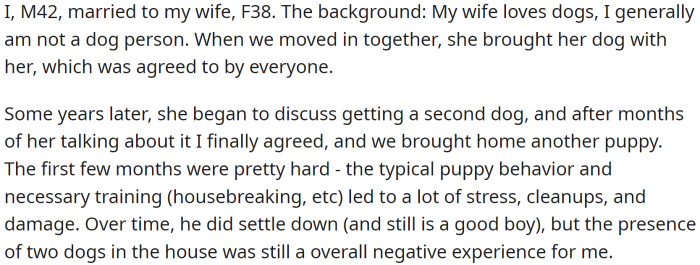
One of the dogs died

Research by Dr. Alan Kazdin, a prominent psychologist at Yale University, emphasizes that while pets can provide emotional support, they are not a substitute for professional mental health treatment. His studies highlight that individuals often seek pets for companionship during times of loneliness or distress, mistakenly believing that an animal can fill emotional voids. This phenomenon can lead to a cycle where the underlying issues remain unaddressed, potentially worsening the individual’s mental health over time. By understanding the limitations of pets in alleviating symptoms of depression, individuals can better prioritize seeking therapeutic interventions that address their mental health needs.
The Importance of Professional Guidance
Ultimately, mental health conditions like depression require careful management and professional guidance. The National Institute of Mental Health emphasizes that therapy and medication can be critical components in the effective treatment of depression. Engaging with a therapist can provide individuals with strategies to cope with their feelings and help them navigate complex emotions surrounding responsibilities, such as pet ownership. Couples should consider seeking therapy together to address underlying issues and develop healthier coping mechanisms, ensuring that both partners feel supported and understood in their mental health journeys.
Understanding Grief and Coping Mechanisms
Grief can manifest in various ways, especially following the loss of a pet. Research in grief psychology suggests that the impulse to adopt another pet can stem from a desire to fill an emotional void.
However, this approach often overlooks the complexities of grief and the importance of processing loss before moving forward.
OP doesn't want another pet because he is the one taking care of the pets

His wife adopted a kitten without his consent.

She is depressed and wants another dog.
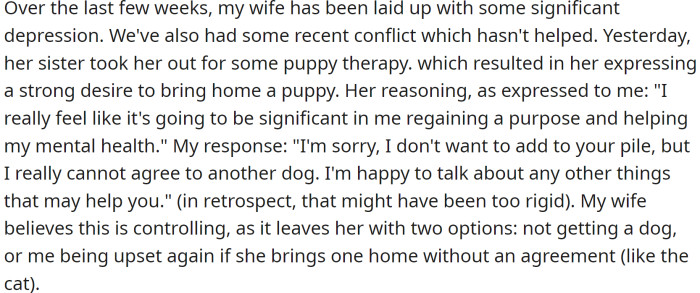
The Role of Responsibility in Mental Health
Behavioral psychologists highlight the importance of responsibility in the context of mental health. Studies show that taking on obligations, such as caring for a pet, can sometimes become overwhelming, especially for someone already dealing with depression. A study published in the Journal of Affective Disorders indicates that while the presence of pets can alleviate feelings of loneliness, the added responsibility of care can exacerbate feelings of inadequacy and stress for individuals facing mental health challenges. Thus, it's critical for partners in such situations to communicate openly about expectations and emotional needs.
According to studies on coping strategies, individuals may turn to pets as a source of comfort during difficult times. Yet, research also indicates that relying solely on pets to alleviate emotional pain can lead to additional stress if the new pet doesn't meet those expectations.
Understanding the underlying motivations for wanting another pet is crucial in this context.
So now OP asks:

OP has offered the following explanation for why they think they might be the a-hole:

OP has pretty valid reasons for not wanting another dog
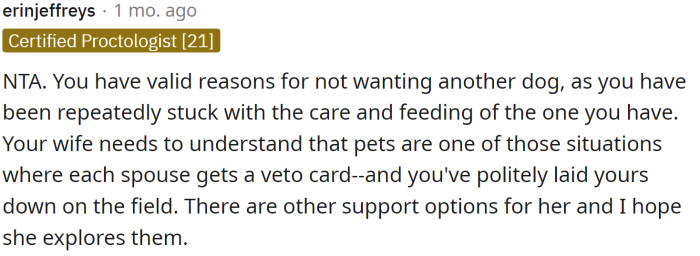
According to research from the American Psychological Association, pets can offer significant emotional benefits, such as reducing anxiety and increasing feelings of connection. However, these benefits depend heavily on the individual's capacity to manage the responsibilities associated with pet ownership. This brings us to the concept of 'self-efficacy'—the belief in one’s ability to manage tasks and challenges. When someone is struggling with depression, their self-efficacy can be diminished, making it more challenging to take on new responsibilities like caring for a pet. This highlights the importance of setting realistic expectations and ensuring that any new commitments align with one's current mental health status.
Navigating Relationships During Grief
The dynamics of relationships can shift dramatically after the loss of a pet. Research indicates that partners may experience differing levels of grief, leading to misunderstandings and tension.
In this case, the wife's desire for a new pet may reflect her way of coping, while the husband's concerns about responsibility could arise from a desire to maintain stability.
This is the truth:

She shouldn't unilaterally add burdens to the household

Absolutely true

Coping Strategies Beyond Pets
While pets can offer companionship, mental health professionals advocate for a broader range of coping strategies for managing depression. Research by Dr. Paul Gilbert, founder of Compassion-Focused Therapy, suggests that engaging in activities that promote self-compassion and social connection can be much more effective than relying solely on pets for emotional support. For instance, practices such as mindfulness, therapy, and community engagement have shown promise in improving mood and resilience. Additionally, couples facing similar dilemmas should consider exploring these alternatives together, fostering a supportive environment that encourages both partners to address their mental health needs holistically.
Open communication about feelings related to grief and the responsibilities of pet ownership can help bridge the emotional gap between partners. Engaging in discussions about the motivations behind wanting another pet can foster understanding and support.
Couples therapy or support groups may also provide valuable tools for navigating these conversations.
This is a good question:
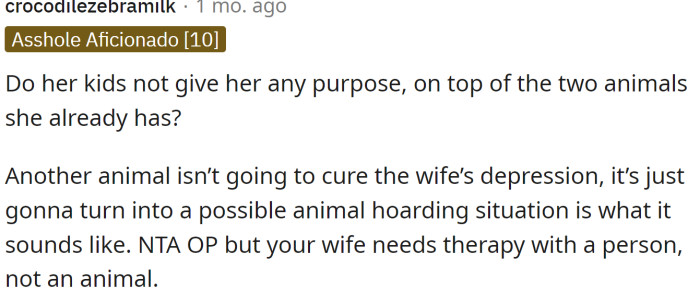
She is doing it all wrong

She needs therapy, not another pet

Dr. Barbara Fredrickson's research on positive psychology illustrates the importance of cultivating positive emotions to counteract the effects of depression. She emphasizes that positive experiences can broaden an individual's thought-action repertoire, leading to increased creativity, flexibility, and emotional resilience. It’s essential for individuals dealing with depression to engage in activities that promote joy and connection, whether that’s through hobbies, social interactions, or even volunteer work. Finding ways to incorporate these positives into daily life can help improve mental health over time, reducing the temptation to seek alternative solutions like acquiring more pets.
The Importance of Emotional Support
Animals can serve as significant sources of emotional support, especially during challenging times. Research in animal-assisted therapy highlights the benefits of having pets as companions in managing stress and anxiety.
However, it's essential to recognize that adopting a new pet isn't a direct substitute for processing grief.
Unfortunately, this happens very often.

OP made his wishes clear and consistent throughout this process.

This Redditor has a slightly different view:

Communication as a Tool
Effective communication is crucial in relationships, particularly when mental health issues are involved. According to Dr. Helen Fisher, a biological anthropologist, "Understanding each other's emotional needs is essential for a healthy relationship." Research indicates that misunderstandings can exacerbate feelings of isolation and frustration. Dr. Fisher emphasizes that couples who engage in open dialogues about their emotional needs tend to experience greater satisfaction and a reduction in conflict. In the case of the husband and wife in the article, having a structured conversation about their feelings toward pet ownership and mental health could lead to a more supportive partnership. They could explore alternatives that respect both partners' needs without the pressure of taking on a new pet.
For individuals coping with loss, engaging in therapeutic practices, such as journaling or meditation, can help process emotions and clarify the motivations behind wanting a new pet. These practices can also enhance emotional awareness, enabling individuals to make more informed decisions.
Moreover, joining support groups can provide a sense of community and understanding during the grieving process.
Redditor shares their experience:

It works for them
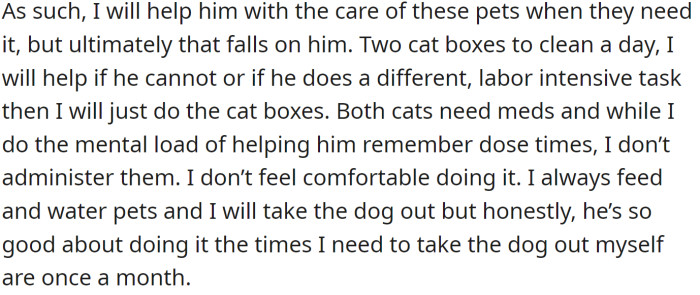
The bottom line is:
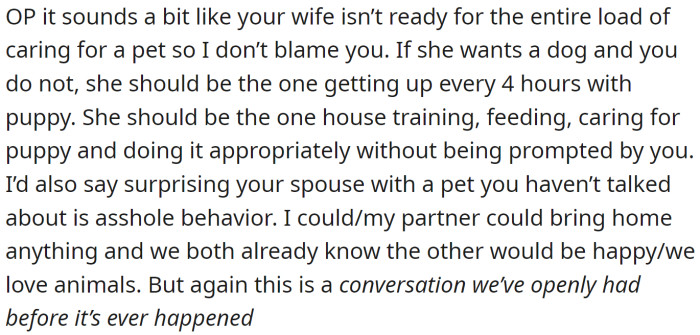
Dr. Elizabeth Dunn, a psychologist at the University of British Columbia, emphasizes that the act of giving can enhance well-being, suggesting that rather than acquiring more pets, couples might consider volunteering at animal shelters. This allows for companionship and engagement with animals without the long-term commitment of pet ownership. Dunn’s research supports the idea that participation in community service can lead to increased feelings of happiness and fulfillment, which can be especially beneficial for someone dealing with depression. By redirecting the desire for a pet into a communal activity, couples can foster connection and purpose while minimizing additional stress.
Exploring Attachment Theory
Attachment theory offers insight into how individuals bond with pets and the emotional repercussions of loss. Research shows that pets often fulfill attachment needs, making their loss feel akin to losing a family member.
Understanding this dynamic can help individuals navigate their feelings when considering a new pet.
Many people believe that having a pet is a magical solution to depression, but that’s not the case. It’s true that a pet can be a great source of comfort and companionship, but it is up to the person to put in the work.
Depression is not cured by simply having a pet; it requires the person to actively participate in caring for the pet. Having a pet can provide structure, purpose, and a sense of responsibility to the person suffering from depression.
Taking the pet for daily walks, playing with them, and providing regular care are all important aspects of caring for the pet that can, in turn, help the person to feel better. Furthermore, having a pet can lead to social interaction with other pet owners or people in the community.
This can be beneficial for someone who is feeling isolated or lonely due to depression. However, the pet can’t do the work for you.
It’s up to the person suffering from depression to put in the effort to care for the pet and to use the pet as a tool to help them cope.
To support individuals in their decision-making process, it's important to encourage reflection on their emotional readiness for a new pet. Engaging in discussions about the unique qualities of the previous pet and the potential new pet can aid in this exploration.
Ultimately, fostering an environment where individuals can process their grief can lead to healthier decisions regarding pet adoption.
Psychological Analysis
This situation highlights the challenges of navigating grief in relationships. The desire for a new pet can often reflect a coping mechanism rather than a readiness for responsible pet ownership.
Encouraging open discussions about grief and individual needs can help partners find common ground and support each other during this difficult time.
Analysis generated by AI
Analysis & Alternative Approaches
Research in psychology emphasizes the complexity of grief and the importance of understanding our motivations for seeking new relationships following loss. Engaging in open communication and emotional exploration can help individuals navigate this challenging period.
As studies suggest, creating a supportive environment where grief can be processed enhances the likelihood of making informed decisions about pet ownership and emotional well-being.
Analysis & Recommendations
Behavioral specialists note that while pets can provide comfort and companionship, they are not a definitive solution to depression. Effective treatment requires a multifaceted approach that includes professional help and open communication between partners. By understanding the limitations of pets in alleviating mental health symptoms and focusing on more comprehensive coping strategies, couples can build a supportive framework that nurtures both individual and relational well-being. Healing is about creating a balanced approach to mental health, where all aspects of life, including responsibilities and emotional needs, are thoughtfully considered.



